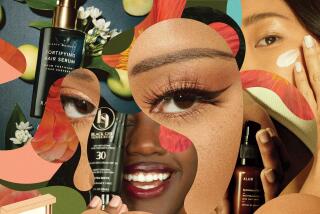Understanding your skin type
- Share via
The Skin Type Solution
A Revolutionary Guide to Your Best Skin Ever
Leslie Baumann
Bantam Books: 515 pp., $22, hardcover
*
EVERYONE dreams of having skin as soft as a baby’s rump, and cosmetic companies are all too willing to promise help in achieving a preternaturally flawless mug with assorted cleansers, moisturizers, toners and wrinkle creams.
But anyone who has relied on a product’s hype, or worse, a friend’s recommendation, knows that both are the road to perdition. A costly product that’s “clinically proven” to erase your particular skin problem may have no effect.
And the serum that worked so well on a friend can become pore-clogging goo when applied to your own skin.
Dr. Leslie Baumann’s “The Skin Type Solution: A Revolutionary Guide to Your Best Skin Ever” tackles this problem with an evidence-based system for matching products to skin type.
A professor of cosmetic dermatology at the Miller School of Medicine at the University of Miami, Baumann has been collecting data on skin types for nearly five years and has written a book that is as much resource guide as skin-care primer.
Based on her research, Baumann has identified 16 skin types that she categorizes according to four scales: oily versus dry (O/D); sensitive versus resistant (S/R); pigmented versus non-pigmented (P/N); and tight versus wrinkled (T/W).
By answering a 64-question test, the reader is assigned a four-letter type. (“OSNW,” for example, would mean that a person’s skin has been rated as oily, sensitive and non-pigmented, with a tendency to wrinkle.)
Baumann devotes a chapter to each skin type, making lifestyle and food suggestions as well as recommending products within a variety of price ranges. She explains the reasons for her choices based on those products’ ingredients.
Baumann dispels some common misconceptions about skin. Among them: good skin care means drinking lots of water, and expensive products are better than inexpensive ones.
A note of caution: Baumann performs research for, or is on the advisory board of, a revolving cast of more than two dozen companies that manufacture skin-care products, including, at various times, Johnson & Johnson, Avon and Allergan.
Although this might cause one to question her objectivity, the more than 200 brands she mentions extend far beyond her affiliations.
In fact, in some situations she steers the reader away from any product at all.
Baumann’s book offers much practical advice, isn’t overly hyped and contains exhaustive, information on how various chemicals, foods and vitamins work to enhance or damage the skin.
For anyone who has ever looked in a hand mirror and shaken his or her head sadly, this is a book worth reading.
Other skin-care books of interest:
* “Dr. Denese’s Secrets for Ageless Skin: Younger Skin in 8 Weeks,” by Adrienne Denese. (2005) A comprehensive guide to skin care, covering diet and offering a variety of interventions for common skin problems.
* “Secrets of Great Skin: The Definitive Guide to Anti-Aging Skin Care,” by David J. Goldberg and Eva M. Herriott. (2003) A user-friendly primer, with diet and fitness tips as well as home and medical remedies for problem and aging skin.
* “The Clear Skin Prescription: The Perricone Program to Eliminate Problem Skin,” by Nicholas Perricone. (2004) Features a 28-day dietary plan for fighting acne. Includes menus as well as vitamin and supplement information.


